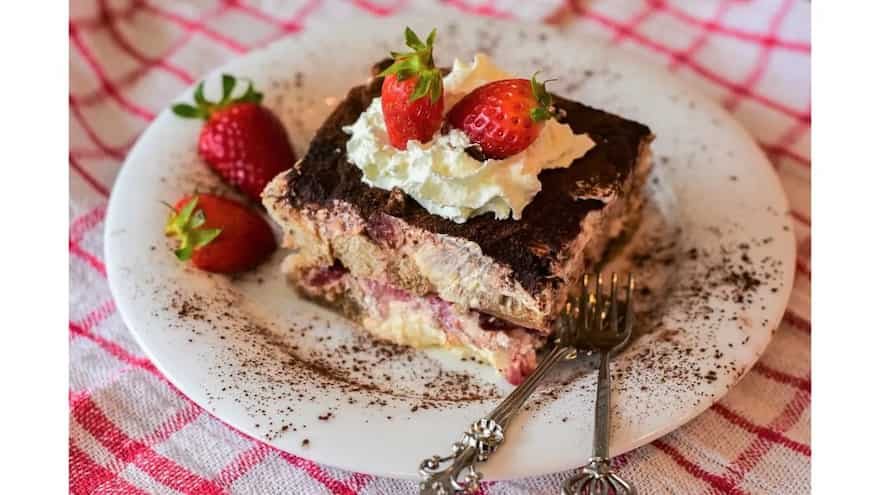Tiramisu is an Italian dessert known for its creamy and indulgent flavours. It typically consists of layers of espresso-soaked ladyfingers and a rich mixture of mascarpone cheese, eggs, and sugar. The dessert is often dusted with cocoa powder, adding a touch of bitterness. Tiramisu's combination of coffee and creamy sweetness has made it a beloved dessert worldwide.
The origins of tiramisu are somewhat debated, but it is widely believed to have originated in the region of Veneto, Italy, specifically in the city of Treviso, during the 1960s or 1970s. The exact creator is uncertain, but it is often attributed to a restaurant in Treviso called "Le Beccherie." Tiramisu gained popularity in the 1980s and quickly became an iconic Italian dessert.
According to this legend, tiramisu was originally created in the 17th century in the city of Siena, Italy. It is believed that a courtesan, a high-class companion, created the dessert to provide energy and pleasure to her clients. She supposedly combined ingredients like eggs, sugar, mascarpone cheese, and coffee to create a luxurious and invigorating treat that would "pick them up" and satisfy their cravings.
The word "tiramisu" translates to "pick me up" or "lift me up" in Italian, referring to the dessert's energising and indulgent qualities. This name reflects the combination of coffee, usually espresso, and the rich flavours of mascarpone cheese, eggs, and sugar.
The cultural significance of tiramisu in Italy lies in its representation of Italian culinary heritage and its association with the country's passion for coffee. Tiramisu has become a symbol of Italian gastronomy, often enjoyed during festive occasions, family gatherings, and special celebrations.
The Flavours and Textures
Tiramisu features creamy and velvety layers of mascarpone cheese, a rich Italian cheese with a smooth and luscious consistency. The mascarpone adds a luxurious and indulgent element to the dessert, providing a creamy contrast to the other components.
The dessert achieves a delicate balance between sweetness and bitterness that comes from the sugar in the mascarpone mixture and the ladyfingers, which are often soaked in espresso or coffee. The bitterness comes from the coffee itself, creating a harmonious contrast that keeps the dessert from being overly sweet.
Espresso and coffee-infused ladyfingers play a crucial role in enhancing the flavour of tiramisu. The ladyfingers, also known as savoiardi, are sponge-like biscuits that absorb the coffee, adding moisture and a coffee-infused taste to each layer. The espresso imparts a robust and distinct coffee flavour, complementing the creamy mascarpone and providing a delightful caffeinated kick.
Tiramisu In Pop Culture
Tiramisu has made appearances in various forms of popular culture, including literature, film, and television. In literature, tiramisu has been mentioned in several books, such as "The Devil Wears Prada" by Lauren Weisberger and "Eat, Pray, Love" by Elizabeth Gilbert, where it is referenced as a delectable Italian dessert.
In the realm of film and television, tiramisu has been featured in numerous scenes, often emphasising its indulgent and seductive qualities. For instance, it is showcased in the films "Big Night," "The Family Man," and "The Holiday," adding a touch of elegance and culinary delight to the stories. TV shows like "Friends," "Sex and the City," and "MasterChef" have also highlighted tiramisu, showcasing its popularity and allure.
These cultural references have helped solidify tiramisu's image as an iconic and desirable dessert, further contributing to its global recognition and the intrigue it holds for food enthusiasts and lovers of Italian cuisine.
Beyond its delectable taste, tiramisu holds cultural and culinary significance as an iconic Italian dessert, symbolising Italy's love for coffee and culinary craftsmanship. Its seductive allure captivates taste buds and evokes a sense of indulgence, making it a timeless and beloved treat that continues to enchant dessert lovers worldwide.
Recipe For Classic Italian Tiramisu

Ingredients:
• 6 egg yolks
• 170 g granulated sugar
• 160 ml milk
• 300 ml heavy cream
• 225 g mascarpone cheese
• 1 teaspoon vanilla extract
• 355 ml strong brewed espresso or strong coffee, cooled
• 24-28 ladyfingers (savoiardi biscuits)
• Unsweetened cocoa powder, for dusting
Instructions:
• In a large mixing bowl, whisk together the egg yolks and sugar until well combined and creamy.
• In a saucepan, heat the milk over medium heat until it reaches a simmer. Remove from heat.
• Gradually pour the hot milk into the egg yolk mixture while continuously whisking. This will temper the eggs and prevent them from scrambling. Once combined, transfer the mixture back into the saucepan.
• Cook the mixture over low heat, stirring constantly, until it thickens and coats the back of a spoon. This will take about 5-7 minutes. Do not let it boil. Remove it from the heat and let it cool completely.
• In a separate mixing bowl, beat the heavy cream until stiff peaks form.
• In another bowl, whisk the mascarpone cheese until it becomes smooth. Add the vanilla extract and mix well.
• Gently fold the mascarpone cheese mixture into the cooled custard mixture until well incorporated.
• Fold in the whipped cream, being careful not to overmix. The resulting mixture should be creamy and smooth.
• Dip each ladyfinger into the cooled espresso or coffee, ensuring they are soaked but not overly saturated. Place them in a single layer at the bottom of a rectangular or square dish.
• Spread half of the mascarpone cream mixture evenly over the ladyfingers.
• Repeat the process with another layer of soaked ladyfingers and the remaining mascarpone cream mixture.
• Cover the dish with plastic wrap and refrigerate for at least 4 hours or overnight. Chilling allows the flavours to meld and the dessert to set.
• Before serving, dust the top of the tiramisu generously with unsweetened cocoa powder using a fine-mesh sieve.
• Cut into squares or rectangles and serve chilled. Enjoy the creamy, coffee-infused delight of classic Italian tiramisu!


